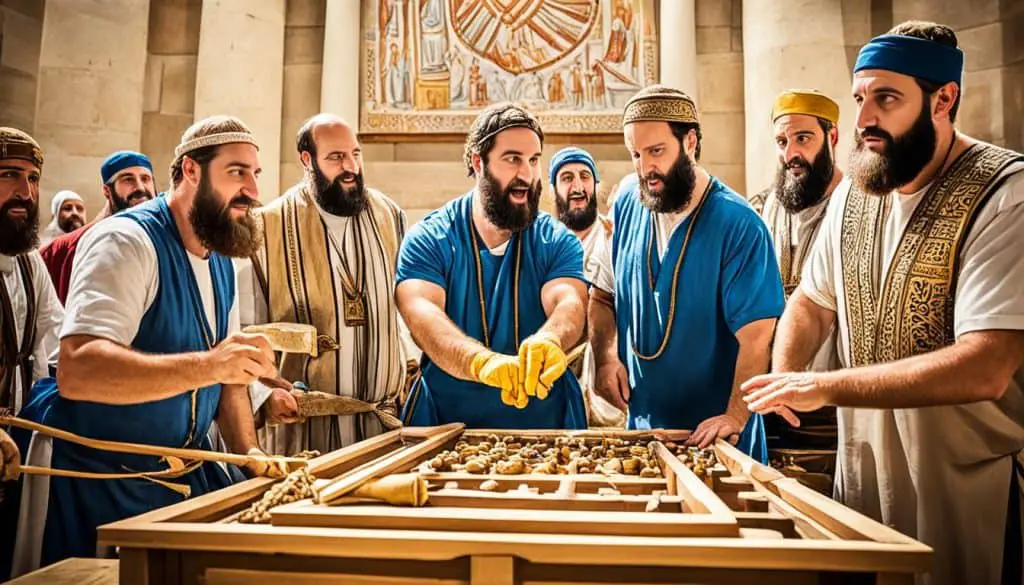Table of Contents
The Levites were often seen only as temple priests. They worked in the temple, leading ceremonies and making sacrifices. But their job was much more than that. They played key roles all over ancient Israelite communities.
These roles made a big difference in society. In this article, we’ll look into seven such important roles. Beyond their work in the temple, the Levites did a lot for their communities.
Ready to learn about the surprising tasks the Levites took on? We’ll show you how important they were in ancient Israelite life. Let’s get started!
Educators and Preservers of the Law
The Levites were key in ancient Israel. They were teachers and guardians of God’s law. Their job included making sure people knew what was right in God’s eyes and how to lead good lives. In Deuteronomy 33:10, it says, “They shall teach Jacob your rules and Israel your law; they shall put incense before you and whole burnt offerings on your altar.”
Teaching was important to them. They made sure everyone respected God’s laws. They kept the faith strong by passing on what God wanted from them. They helped people know how to be good according to the teachings of the Bible.
Keeping God’s teachings safe was also their duty. They made sure the teachings stayed clear and unchanged for future generations. This way, the community could always follow their faith and traditions.
“The Levites diligently preserved the laws and teachings of our ancestors. They were the custodians of our spiritual heritage, passing down the sacred knowledge that guided our people for centuries.”
The Levites had a big impact on Israel. Their commitment was crucial. It ensured the future of their religious and cultural knowledge. They helped preserve the spiritual heritage of their people through teaching and protecting God’s laws.
| Responsibilities | Significance |
|---|---|
| Teaching God’s laws and decrees | Empowering the community with knowledge and moral guidance |
| Preserving sacred texts and traditions | Ensuring the continuity and integrity of religious practices |
In the end, the Levites were much more than priests. They were the educators and protectors of God’s teachings. Their work went beyond the temple. They taught the people right from wrong, shaping their community’s spirit and morals.
Caretakers of the Tabernacle/Temple
When the Israelites moved, the Levites had a special job. They took apart, carried, and put back together the tabernacle (Numbers 1:50-53). Even when the temple was built, they kept doing this work (1 Chronicles 6:31-32).
The Levites were essential in looking after the tabernacle and the temple. They made sure the holy buildings were in good shape and safe. As the people moved through the wild, the Levites took down the tabernacle. It was like God’s home with the community.
They carefully took apart each piece to move them to the next stop. When they camped, the Levites set it all up again. This let the Israelites worship and be close to God.
“The tabernacle was much more than just a physical structure; it was a representation of God’s presence among His people,” explains biblical scholar David Smith. “The Levites understood the importance of their role as caretakers, ensuring that the tabernacle remained a sacred space where the Israelites could encounter God.”
Later, with the temple, the Levites had more duties. They took care of the big temple’s upkeep and made sure it stayed pure. They worked to keep the temple safe and working well.
The Levites’ work was key in keeping the tabernacle and temple holy. They looked after the buildings and kept them safe from harm. Their job showed their love for God and their dedication to the holy places.
Doing their job well was a sign of how much the Levites honored God. They made sure worship places were always ready for people to connect with God.

Musicians and Singers
The Levites had many duties, including leading music in temple worship. They used songs to honor and worship God. This was seen in the Scriptures, like 1 Chronicles 15:16-22.
Music is a rich way to express thoughts and feelings. For temple worship, it was even more essential. The Levites used their musical gifts to guide everyone in praising God with songs and instruments.
Having musicians and singers in the temple did more than just add to the atmosphere. It made the spiritual connection stronger. The beautiful words and music helped people feel closer to God.
“Sing praises to God, sing praises! Sing praises to our King, sing praises! For God is the King of all the earth; sing to him a psalm of praise!” (Psalm 47:6-7)
The music also had a practical purpose. The Levites played instruments like lyres, harps, and cymbals. This made the singing more beautiful and uplifted the worship to a more spiritual level.
Their work as musicians and singers was a big deal. It showed how important creativity is in worship. They helped everyone connect and sing their love for God together.
The Levites were an example for everyone. Their hard work in music showed that worship is about more than just rituals. It’s also about joyfully expressing love for God through music.
Levites as Musicians and Singers: A Table of Instruments
| Instrument | Description |
|---|---|
| Lyre | A stringed instrument similar to a small harp, played by plucking the strings. It produced soothing melodic tones. |
| Harp | A large, multi-stringed instrument played by plucking or strumming the strings. Its resonant sound added beauty and depth to musical worship. |
| Cymbals | Metallic percussion instruments played by striking together. They contributed to the rhythmic and vibrant aspects of musical worship. |
Guards, Gatekeepers, Assistants, Administrators, Leaders, and Teachers
Levites weren’t just inside the temple. They had a big job protecting sacred places. They watched over the tabernacle and kept its items safe (Numbers 18:7).
They helped the priests in temple rituals but weren’t priests themselves. They worked alongside the Aaronic priests to make sure everything went smoothly (Numbers 18:2-5).
Levites also brought order to the Israelite cities. They served as judges and administrators. This kept their towns fair and peaceful (Joshua 21).
The Levites also taught and led in their communities. They shared their deep knowledge of the law. This made them leaders that many looked up to for guidance (Numbers 18:7).




